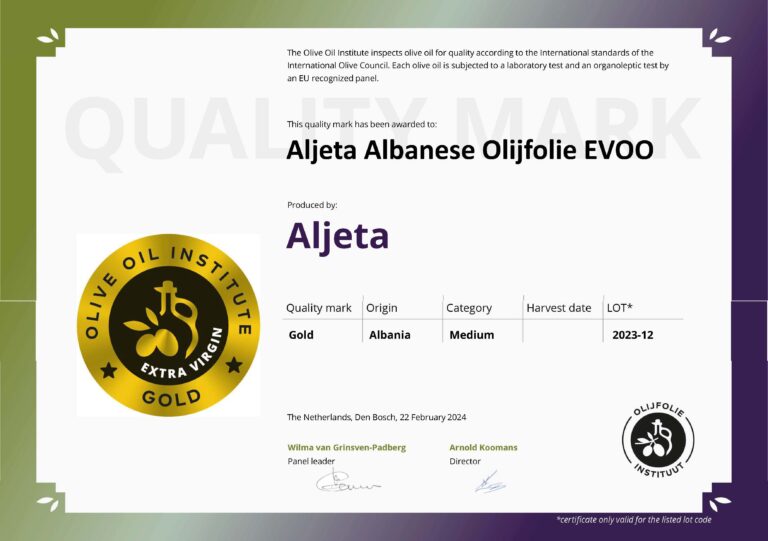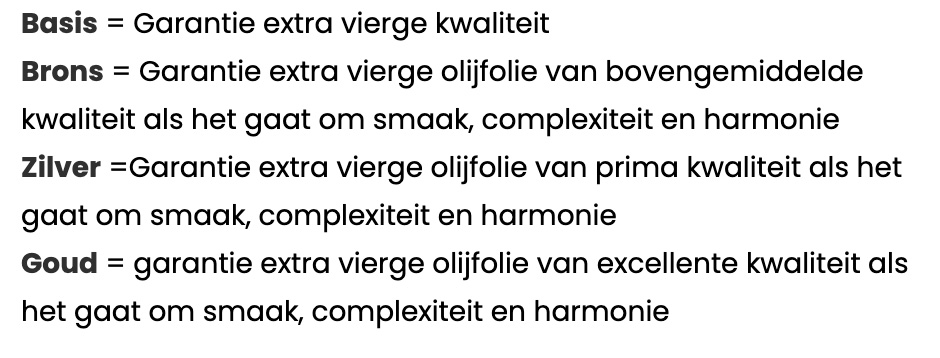
Albanian Pastiçe: Easy baked pasta recipe
Discover Albanian pastiçe: bucatini with feta and eggs baked into a golden pie—simple, nourishing and perfect for hectic days.
Everyone sometimes wonders if olive oil sold as extra virgin can really carry that qualification. There is so much dishonesty and fraud in the world that extra virgin olive oil should have an official quality mark. Well, that quality mark exists.

A random sample from the Olive Oil Institute at the three largest Dutch supermarkets found that 74% of the bottles of olive oil labeled as extra virgin did not comply with the labeling. In some cases, it was so bad that the olive oil should be labeled as lampante oil (lampante) and no longer suitable for human consumption.
The Olive Oil Institute is an independent organization that evaluates olive oil and then issues a quality mark for it in the form of gold, silver or bronze.
Don’t think the process is easy, as the olive oil must undergo a number of rigorous tests. First, it is subjected to pre-selection, where the oil is examined for flaws. This involves the use of an electronic nose called the e-Nose. This detects “errors” such as the wrong production process, incorrect storage, outdated oil, or the addition of other substances. Real noses are then brought into position. The organoleptic panel works according to the guidelines established by the International Olive Council (I.O.C.). The panel evaluates the oil according to a 100-point system and issues a quality mark based on the results.
Aljeta extra virgin olive oil has passed this double inspection with flying colors and has now earned a gold quality seal. This means that our olive oil is among the very best extra virgin olive oils for sale in the Netherlands.

How good is Aljeta extra virgin olive oil according to the Olive Oil Institute’s quality mark? Very good is the answer, as they characterize “gold” as an extra virgin olive oil of “excellent quality in terms of flavor, complexity and harmony.

Discover Albanian pastiçe: bucatini with feta and eggs baked into a golden pie—simple, nourishing and perfect for hectic days.

The flag of Albania is more than just red and black. This article explores the deeper meaning behind its national symbols – from the double-headed eagle to the traditional ‘Shqiponja’ hand gesture, the unique Albanian language, and the country’s rich cultural heritage. A story of pride, identity, and history captured in one powerful symbol.

This homemade chili oil with Extra Virgin olive oil is a flavor bomb that’s also great for your health. Easy to make and incredibly versatile.

Albania is home to thousands of medicinal plants. Discover how traditional herbal wisdom not only impacts lives, but also shapes a unique export industry.

Despite an increase in risk factors such as an unhealthy diet and less physical activity, cardiovascular mortality in Spain remains surprisingly low. What explains this mysterious ‘Spanish Paradox’? Discover how a key element of the Mediterranean diet plays a crucial role.

The Albanian olive harvest is severely impacted by a labor shortage, leading to a significant decline in olive oil production and exports. In the first nine months of 2024, exports dropped by 60% compared to the same period in 2023. This not only poses challenges for the domestic market but also hinders Albania’s position as an emerging olive oil producer.